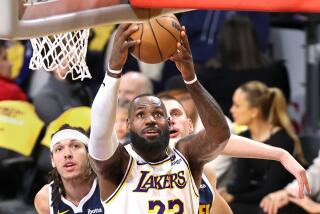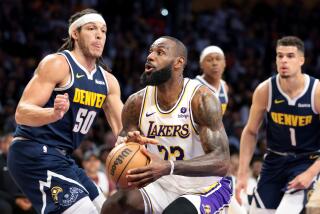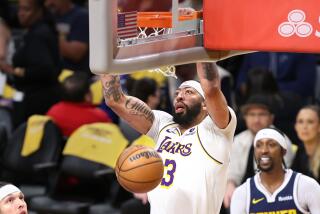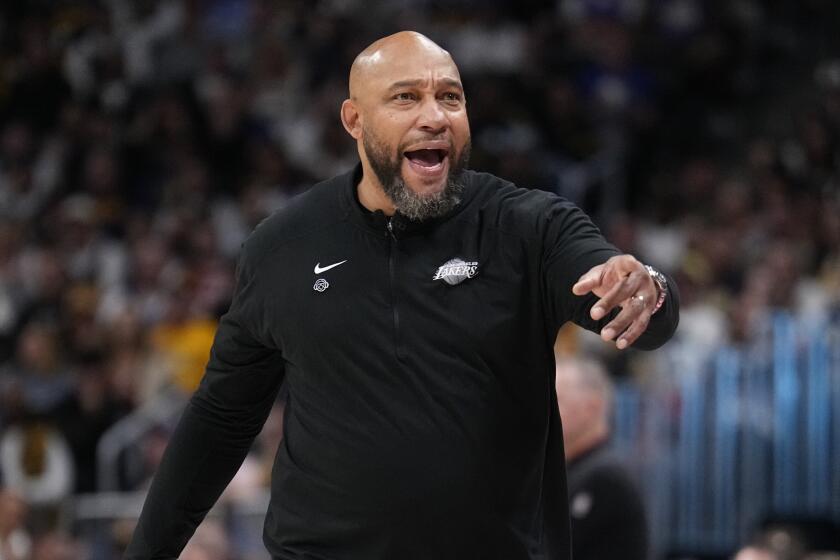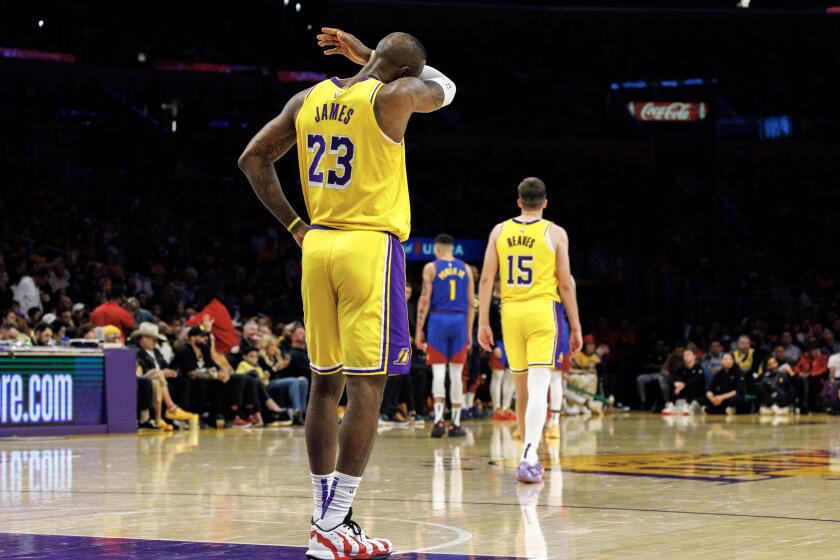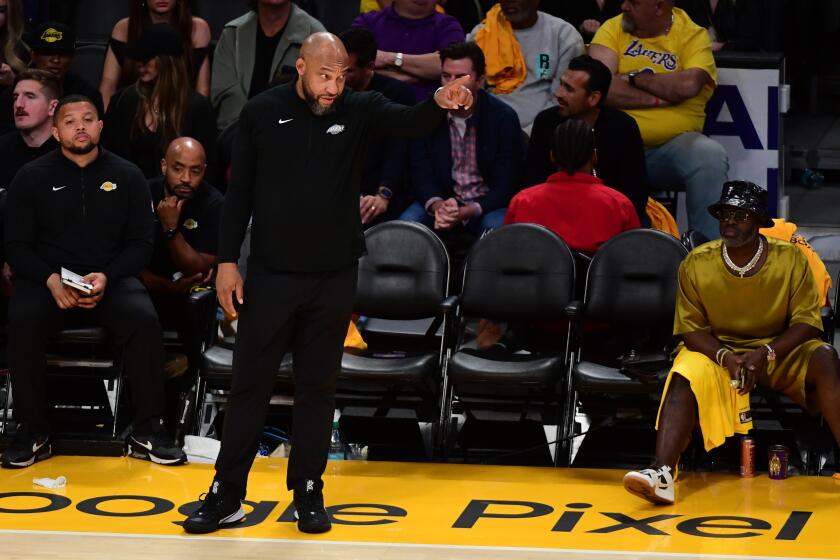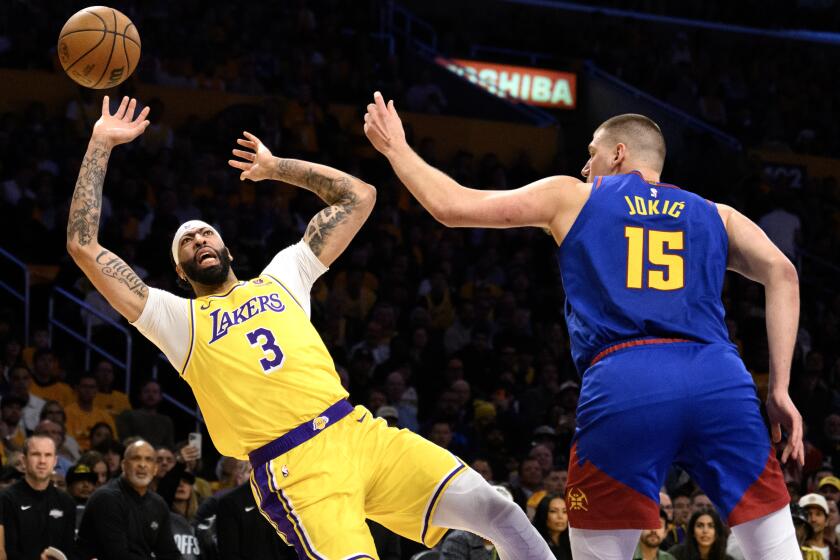Reebok Won’t Foot the Bill for Bryant’s Shoe Endorsement
Los Angeles Lakers guard Kobe Bryant has three world championship rings, the league record for outside scoring and a string of 40-point games studded with moves that have left defenders flat-footed.
But on Friday, Bryant came up against a different kind of opponent: bottom-line economics.
In the midst of intense negotiations over a new shoe endorsement deal, Reebok International Ltd. said it concluded that the NBA all-star wasn’t worth the millions he wanted.
“We worked hard to look at the various ways in which we might make the most out of a partnership with Kobe,” Reebok Chief Executive Paul Fireman said in a statement. “But in the end, we realized that we simply could not justify the costs, which our analysis showed could exceed the benefits.”
Although Bryant might inspire comparisons on the court with basketball great Michael Jordan, his marketability has fallen short.
Some sports marketing experts say he does not connect with young urban blacks who drive the sales of high-end sneakers. Bryant, who has lived overseas and speaks Italian, is perceived in some quarters as being too suburban, too aloof.
Bryant tried once to tinker with his image by cutting a hip-hop record, but it flopped.
Bryant said Friday night that it was his decision to break off the talks earlier this week because he felt uncomfortable with the company’s negotiating tactics.
“It’s not the place for me,” he said before the Lakers’ game at Staples Center. “Actually, Reebok, what I learned about them throughout the negotiation process is they’ll back away from the table and then they’ll come back to eat the next night. At this point, I really don’t want to go that route.”
He said his promotional value was not an issue in his break with Reebok, and he dismissed the firm’s public assessment of his marketing clout as “politics. They have to cover [themselves]. I accept that.”
The demise of the proposed Reebok deal gives negotiating leverage to Nike Inc., the only major shoe company now vying for Bryant’s endorsement. But it also underscores new realities in the rapidly changing world of sports marketing.
As sales of signature basketball shoes continue to slump, the old marketing models no longer apply, say industry and stock analysts. Companies can’t afford to throw large sums of money at the league’s biggest stars in the hopes of duplicate Nike’s phenomenal success with its Air Jordan line.
Dean Bonham, a Denver sports marketing agent, said that although he may differ with Reebok’s assessment of Bryant’s promotional clout, its decision Friday was a “classic example of the kind of shakeout we’ve been seeing in the footwear and apparel industry during the last three or four years.”
Meanwhile, say others, Bryant finds himself sharing a shrinking endorsement stage with the likes of newcomers Yao Ming of the Houston Rockets and Ohio high school basketball sensation LeBron James.
Already, rookie Yao has scored a hit with the public with his Apple Computer ads, while James has shoe companies tripping over themselves in an effort to get his endorsement.
“Between Yao and LeBron, they suck all of the air out of the marketing room,” Newport Beach sports agent Leigh Steinberg said. “It takes potential bidders and marketing dollars away from Kobe’s plate.”
That’s not the marketing world Bryant envisioned when he broke away from Adidas last year in an attempt to seek out a better deal for himself. It cost Bryant an estimated $8 million in lost fees and an additional $10 million he has to repay when he signs a new contract, said two industry sources familiar with the terms. Bryant, coming off his third consecutive NBA championship, was expected to land a record-setting contract based on his prowess on the court.
But the biggest concern in the shoe talks quickly became Bryant himself, said a source familiar with the negotiations. Shoe companies have worried about the star’s apparent lack of street credibility with “ballers,” the nickname for players found on the grittiest inner-city basketball courts from New York to Los Angeles.
Those players -- largely black teens and adults in their 20s -- buy an estimated 90% of high-end shoes costing $100 and more and start trends that ripple out to suburban malls. Among the top sellers: Nike’s Jordan line, Adidas’ shoes named after the Orlando Magic’s Tracy McGrady and Reebok’s shoes endorsed by Philadelphia 76ers bad boy Allen Iverson.
At the public courts on Venice Beach, the mention of Bryant’s name provokes mixed emotions -- not the urge to splurge on his footwear. After a spirited pickup game, Rich Baderinwa said he respects Bryant’s game but can’t see himself in Bryant’s shoes.. . He scoffed in particular at Bryant’s attempt at rapping.
“His rap was whack,” said Baderinwa, 26, of Venice. “When he put out that CD, nobody bought it. And you know why nobody bought it? Because nobody bought him.”
Neither have many shoe buyers, industry figures show. One of Adidas’ Kobe models was the industry’s 38th bestselling shoe in 2000, with $4.9 million in sales, according to SportScan Inc., a Florida tracking service. That compares with $26.7 million for the No. 1 selling Air Jordan XV.
Worse still were sales for the Kobe II. Designed to look like a sporty Audi, it quickly became a marketplace Edsel. One style generated $1.3 million in revenue last year, but it never made the top 50, figures show. Introduced at $121 a pair, it wound up in sales bins at $50.
.John J. Shanley, an athletic footwear industry analyst at Wells Fargo Securities, blamed the shoe’s abysmal sales on its odd design. “It was bizarre beyond belief,” he said of the shoe. “Someone in [Adidas’] design department thought it was cool. Kids thought it was dumb.”
The ad campaign also muddied the image of Bryant, who had been portrayed in one Adidas commercial riding a motorcycle and in another speaking Italian in a Roman garden.
That meant whoever signed Bryant for a new shoe deal needed to give his persona an overhaul, either to help him find a new audience or make him more accessible to urban consumers, said a source close to the negotiation.
“It’s a question of rebuilding and remarketing his image,” the source said. “Can his excellence on the court be matched off the court? Nobody knows. But then you look at of the young players coming up that are culturally connected, and those might be a better risk.”
In the end, Reebok balked at paying Bryant the kind of guaranteed fee that many had predicted when he first became an endorsement free agent. It offered him $5 million a year but insisted the rest come from a cut of the profit. It was a way of sharing the risk with Bryant if a new shoe and apparel deal didn’t pan out, but it also offered the star an upside if his new image connected, the source said.
Although the $5 million is respectable, it is below the $6 million McGrady receives from Adidas and the estimated $7 million Reebok already pays Iverson.
Reebok seemed to be closing in on the deal two weeks ago, when Nike, frustrated at the slow pace of the talks, gave Bryant’s representatives a Feb. 10 deadline to accept its deal or have it withdrawn, according to insiders. Nike executives declined to comment Friday.
After the All-Star game, talks with Reebok deteriorated, and it became apparent Bryant wanted more money.
That’s when the deal unraveled, leading to Friday’s statement by Reebok, which sharply concluded that “the costs of the proposed Bryant contract could outweigh the return on the investment.”
More to Read
All things Lakers, all the time.
Get all the Lakers news you need in Dan Woike's weekly newsletter.
You may occasionally receive promotional content from the Los Angeles Times.
